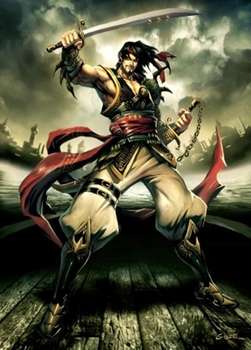Sinbad the Sailor

Sinbad the Sailor is an outcome report about a venture capitalist who goes on seven high risk business ventures to open new trade routes to oversea markets, only to have unforeseen complications create areas of opportunity for his negotiating skills to create mutually beneficial outcomes.
Or at least, that would be the modern interpretation of Sinbad. This middle eastern fable is a collection of stories told in a manner similar to the Thousand And One Nights; Hinbad the porter stops to rest outside the mansion of Sinbad the merchant, and laments that for chance he missed out on the amazing riches of the latter, which he won very easily. However, who should hear him but Sinbad the sailor? Rather than be angry at his jealousy, he invites the porter to sup with him and regales him for seven consecutive nights with the tales of his fortunes and misfortunes, adventures and perils, giving him 100 gold coins at the end of each.
Despite being commonly called "the Sailor," Sinbad is a merchant and a ship-owner, and has adventures in places reached by sailing, but is not himself a sailor of any sort.
Sinbad has proven a popular figure in the cinema and on TV, where, however, his adventures have generally had little connection with his original 1001 Nights version.
Not to be confused with Popeye The Sailor, though they did "costar" together in Popeye the Sailor Meets Sindbad the Sailor.
- The Adventures of Sinbad
- Arabian Nights - the original Seven Voyages are usually included in this collection
- Captain Sinbad
- The Golden Voyage of Sinbad
- The Magic Voyage of Sinbad
- Popeye the Sailor Meets Sindbad the Sailor
- The 7th Voyage of Sinbad
- Sinbad and the Eye of the Tiger
- Sinbad: Legend of the Seven Seas
- Sinbad the Sailor
- Sinbad Jr., whose theme song describes the hero as "Sinbad the Sailor" (with no Jr.)
- Sonic and The Secret Rings
Tropes used in the Seven Voyages:
- Arabian Nights Days
- City of Gold
- Disproportionate Reward: Perhaps filtered by Values Dissonance, but the rich kings and caliphs in Sinbad's tale do seem to enjoy lavishing him with presents and riches.
- Doom Magnet: Sindbad is unlucky, very unlucky. However, his crews tend to be a lot unluckier - at least Sindbad always survives. Most of the stories end with him the sole survivor of some terrible cataclysm. Or begin that way. Then it goes From Bad to Worse. Then he gets rich(er). Then he goes out on more adventures and does it again!
- Dwindling Party: Sinbad tends to be the lone survivor of a lot of his tales.
- Framing Device: Sinbad tells his stories to Hinbad the porter over several dinners.
- Guile Hero: Only rarely does Sinbad ever need to use violence to escape his predicaments.
- The Homeward Journey
- Intrepid Merchant
- Mr. Vice Guy: Sinbad is a lot like Scrooge McDuck, ambitious (but not evil, Values Dissonance not withstanding) and out to make a buck. In fact, by the end he's one of the richest men in Baghdad.
- Sole Survivor
- Walking the Earth: Well, more like sailing the ocean, but still.
Tropes used in the First Voyage:
- Turtle Island: The sleeping giant whale has a forest growing over it.
Tropes used in the Second Voyage:
- Giant Flyer: The Roc.
Tropes used in the Third Voyage:
- Attack of the 50-Foot Whatever: Sinbad lands in a nest of snakes... giant snakes.
- Does This Remind You of Anything??: Many see parallels with The Odyssey in this tale.
- Eye Scream: Sinbad and the other sailors blind the Cyclops with an Olive branch.
- Giant Mook: The Cyclops.
- Go for the Eye
- I'm a Humanitarian: Mmm. Mmm. Sailors!
Tropes used in the Fourth Voyage:
- Cannibal Tribe: Sinbad just keeps getting captured by cannibals, doesn't he?
- Lotus Eater Machine: Well, plain old "Lotuses" anyway. The natives make their other captives docile with an herb to fatten them up.
- Together in Death: The bad kind. The kingdom has a custom that when the husband dies, the wife will be entombed with him.
Tropes used in the Fifth Voyage:
- Can't Hold His Liquor: Sinbad's homebrew makes the Old Man fall off his back, and then he kills him.
- Death From Above: What the Rocs do after the sailors eat one of eggs.
- Made a Slave: The Old Man clings to Sinbad's back and can't be shaken off, he rides him around.
- Maniac Monkeys
Tropes used in the Sixth Voyage:
- Worthless Yellow Rocks: The land of Serendib is so jewel studded it's a massive piece of jewelry.
Tropes used in the Seventh Voyage:
- Our Demons Are Different: The inhabitants of the city turn out to be demons.
- Shapeshifting: And they happen to turn into birds once a month.